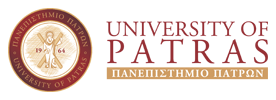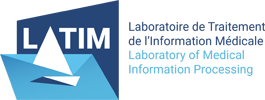
University of Patras – 3DMI Group
George Kagadis’s group is established within the Laboratory of Medical Physics, University of Patras, Greece. The main research areas this group is working at are:
- Image processing and analysis: Imaging is a critical component in the detection, characterization and treatment of various illnesses. The rich information content of various advanced imaging approaches, along with the growing capacity of collecting images in different time points, gives the opportunity to process and analyze data that are of complementary value to the medical decision. We process collected information to produce knowledge of additional value to our clinicians. To this end, we are applying various Artificial Intelligence methodologies, incorporating Machine Learning, and – more recently – Deep Learning.
- Monte Carlo simulations: Monte Carlo techniques in Medical Physics, are mainly used to simulate a range of medical applications that exploit ionizing radiation, for imaging/therapy purposes or for dosimetric applications in the macro- and/or nano-scale. Our group uses such Monte Carlo techniques to simulate procedures, where ionizing radiation interact with biological matter and/or detectors (in SPECT-PET-CT), for the optimization of radiation therapy and imaging procedures. We use highly detailed anthropomorphic computational phantoms, as well as highly detailed computational animal phantoms, for clinical and pre-clinical studies. To this direction we use the GATE open-access simulations toolkit for Radiation Therapy and Brachytherapy procedures’ simulations, as well as QSPECT, STIR and CaSTOR for image processing and analysis simulations. Furthermore, we have recently started using Geant4-DNA to simulate the DNA Damage Response to ionizing radiation.

Bioemission Technology Solutions IKE
BIOEMTECH (www.bioemtech.com) is a fast-growing Greek SME in the field of biomedical engineering, bridging the gap between ex vivo studies and in vivo molecular imaging by providing solutions in terms of instrumentation and services. The company designs and develops benchtop molecular imaging systems and provides imaging services for the preclinical evaluation of nanoparticles and other novel compounds. In addition, BIOEMTECH offers unique expertise in terms of advanced simulations at multiscale level, Artificial Intelligence algorithms and exploitation realistic computational models based on clinical and preclinical data. BIOEMTECH laboratories, provide preclinical services that cover a wide range of studies, from an in vitro level, to radiochemistry, animal hosting, toxicology, and multi-modal in vivo imaging, both with BIOEMTECH’s dynamic imaging systems and with high resolution tomographic systems for SPECT, PET, CT and Optical in vivo imaging.
BIOEMTECH is now a multidisciplinary team of 14 young scientists with strong background in biomedical engineering, medical physics, bioinformatics, radiochemistry, biology and nanomedicine. The company was founded in 2013 and up to now, BIOEMTECH:
- Participated in 8 H2020, 4 ERANET, 1 COST and 3 NSRF (national) funded research projects.
- Released 3 commercial benchtop imaging products “γ-eye”, “β-eye” and “φ-eye”
- Organises educational/training and dissemination activities (e.g. workshops),
- Is official member in ETPN, OpenGATE and EARA networks.
In 2019, BIOEMTECH obtained a pre-seed investment by a Venture Capital scheme and can offer additional expertise towards the development of exploitation business plans and dissemination and outreach activities

CNRS (CREATIS Lab)

INSERM (INSERM UMR1101, LaTIM)

Institute for Advanced Studies (IHS)
The Institute for Advanced Studies (IHS) is an independent, non-profit research institute in Vienna (Austria). It brings together high-level expertise from various disciplines (economics, sociology, and political science, among others) to address fundamental economic and social problems and policy choices. Internationally renowned scientists stay at the Institute as guest researchers, and PhD candidates use its excellent facilities to conduct their studies. IHS alumni make career in academia, governmental institutions, and in the private sector. The IHS was incepted in 1963 under the auspices of two esteemed scholars, Paul F. Lazarsfeld and Oskar Morgenstern with a generous grant from the Ford Foundation. Today, the Institute is funded by the Austrian government, by various public organizations and by commissioned research. IHS has coordinated and participated in numerous projects within the EU Framework Programs and has extensive experience in disseminating research results. Currently the Institute counts approximately 100 employees. The group science technology and social transformation focuses on the interrelationship of science, technology and society. https://www.ihs.ac.at/ru/science-technology-and-social-transformation/